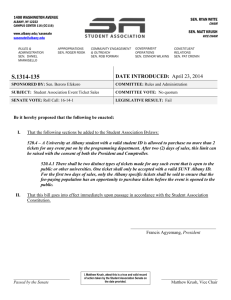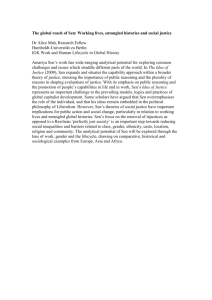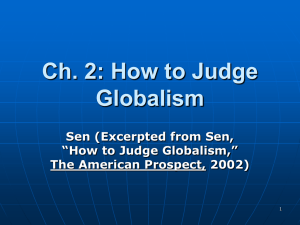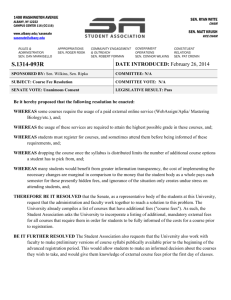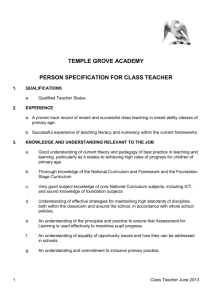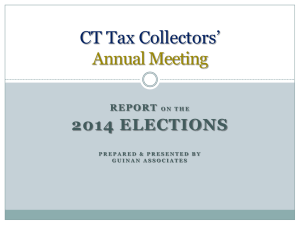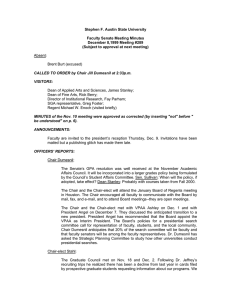Stephen F. Austin State University Faculty Senate Meeting Minutes
advertisement
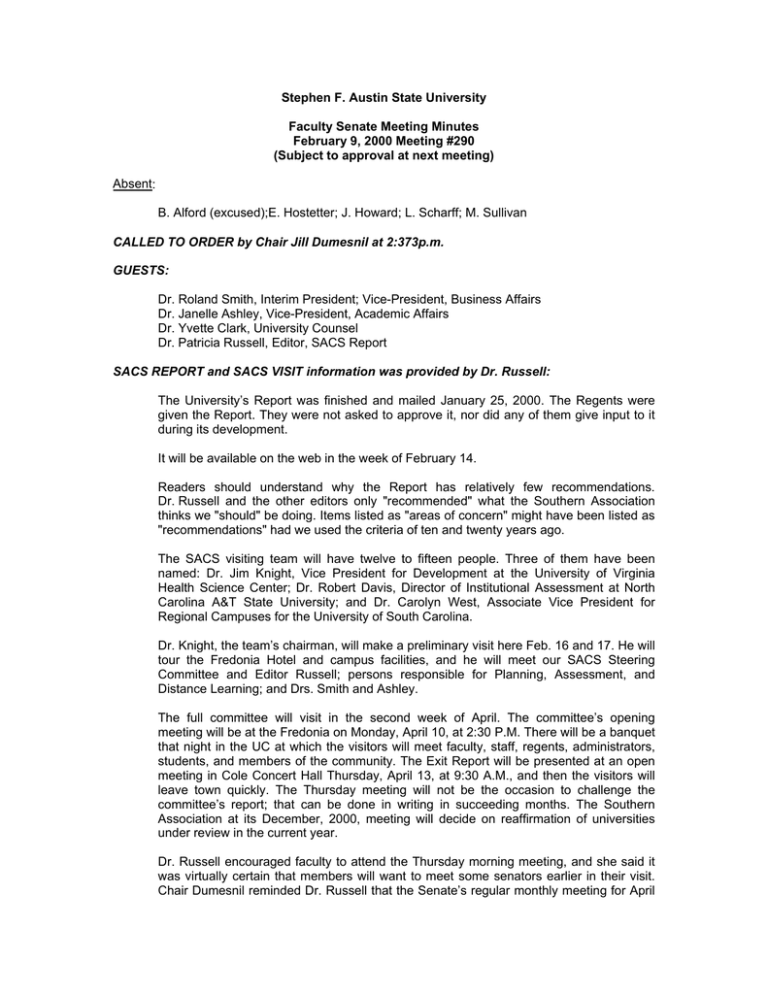
Stephen F. Austin State University Faculty Senate Meeting Minutes February 9, 2000 Meeting #290 (Subject to approval at next meeting) Absent: B. Alford (excused);E. Hostetter; J. Howard; L. Scharff; M. Sullivan CALLED TO ORDER by Chair Jill Dumesnil at 2:373p.m. GUESTS: Dr. Roland Smith, Interim President; Vice-President, Business Affairs Dr. Janelle Ashley, Vice-President, Academic Affairs Dr. Yvette Clark, University Counsel Dr. Patricia Russell, Editor, SACS Report SACS REPORT and SACS VISIT information was provided by Dr. Russell: The University’s Report was finished and mailed January 25, 2000. The Regents were given the Report. They were not asked to approve it, nor did any of them give input to it during its development. It will be available on the web in the week of February 14. Readers should understand why the Report has relatively few recommendations. Dr. Russell and the other editors only "recommended" what the Southern Association thinks we "should" be doing. Items listed as "areas of concern" might have been listed as "recommendations" had we used the criteria of ten and twenty years ago. The SACS visiting team will have twelve to fifteen people. Three of them have been named: Dr. Jim Knight, Vice President for Development at the University of Virginia Health Science Center; Dr. Robert Davis, Director of Institutional Assessment at North Carolina A&T State University; and Dr. Carolyn West, Associate Vice President for Regional Campuses for the University of South Carolina. Dr. Knight, the team’s chairman, will make a preliminary visit here Feb. 16 and 17. He will tour the Fredonia Hotel and campus facilities, and he will meet our SACS Steering Committee and Editor Russell; persons responsible for Planning, Assessment, and Distance Learning; and Drs. Smith and Ashley. The full committee will visit in the second week of April. The committee’s opening meeting will be at the Fredonia on Monday, April 10, at 2:30 P.M. There will be a banquet that night in the UC at which the visitors will meet faculty, staff, regents, administrators, students, and members of the community. The Exit Report will be presented at an open meeting in Cole Concert Hall Thursday, April 13, at 9:30 A.M., and then the visitors will leave town quickly. The Thursday meeting will not be the occasion to challenge the committee’s report; that can be done in writing in succeeding months. The Southern Association at its December, 2000, meeting will decide on reaffirmation of universities under review in the current year. Dr. Russell encouraged faculty to attend the Thursday morning meeting, and she said it was virtually certain that members will want to meet some senators earlier in their visit. Chair Dumesnil reminded Dr. Russell that the Senate’s regular monthly meeting for April will be on the 12th, and that would be an excellent time for the SACS team to talk with faculty senators. In concluding her report, Dr. Russell said she and Co-editor Violet Rogers are very grateful to all who helped work on the report. She realizes practically all faculty and staff have contributed to it, and she hopes all know their work has been appreciated. UNIVERSITY COUNSEL YVETTE CLARK was invited to the meeting to answer questions about legal matters. Chair Dumesnil asked how the current policy on Cheating and Plagiarism (Policy A-9.1) applies to a student accused of cheating if the student withdraws with a W before the drop day at mid-semester. Is that student immune to any penalty? Counsel Clark: Such a student does not gain immunity by dropping the course. Although the instructor could no longer impose an F for the course, the faculty member could pursue the penalty process. Penalties could include suspension or expulsion from the university, and a finding of fact can go on the student’s record. Faculty should inform a student when a grade is based on academic dishonesty. Sen. King: Do faculty have to tell an accused student he or she has various rights of appeal? Clark: Faculty and students have equal obligations to know policy. Sen. McCune: If a faculty member follows correct procedures, can a student found not guilty sue for false accusation? And if so, what about legal indemnity? Clark: State attorneys would defend. Only if the faculty member is found to act in bad faith, maliciously, would he or she not be indemnified by the state. Sen. Stahl: What about plagiarism discovered at the end of the semester, too late to inform a student who has left town? Clark recommended sending a letter explaining why the grade is F--even if the letter were not delivered, the faculty member would have done everything possible. Sen. Perritte: How does an offense become "part of the student’s record"? Would it be on the transcript? Clark: The offense would not be mentioned on the transcript; she recommends a letter to the department chair or dean. Sen. Devine: What if the student transfers to another university? Can we inform the other university? Clark: That would depend on circumstances. Chair Dumesnil asked whether requiring faculty to sign outside employment forms was constitutional? Sen. King: The case of Hoffman vs. Texas raises questions about it. Clark: She is not familiar with the case Dr. King refers to, however there is important litigation in Hoover vs. Morales. involving conflict of interest issues. The Texas Faculty Association challenged the two-year old "expert witness rider" law forbidding state employees to testify against the state. An initial court decision was that the state may not prohibit state employees from testifying against the state, and that decision was upheld by the Fifth Circuit Court of Appeals; this leaves the constitutionality of laws regarding "conflict of interest" with the state under debate. In another case, the current policy regarding outside employment was upheld by the attorney general. Dumesnil: Has the outside employment policy been challenged on the grounds of privacy issues? Clark: Outside employment policies are common; she does not know of privacy arguments having been raised against them. King: In the Hoffman case, an employee who had been dismissed for ignoring an outside employment policy won his case. A third question from Chair Dumesnil was about the timing of our nine-month contracts. Contracts run from September 1 through the end of May, but does not coincide with the times of the Fall and Spring semesters. How long before and after the semesters do our contracts oblige? Clark: As long as there is a nine-month commitment, the starting and stopping times are not pertinent. Sen. Ballenger: If you are injured while on university business a week before the semester begins, would you be considered to have been working for the university at that time? Clark: Probably yes. Probably you would be considered to be on university business even if your injury occurred in mid-summer if you were working on a university committee. Sen. Perritte: If a visitor at an SFA function is injured, is SFA or the state liable? Clark: Probably not, unless the university was grossly negligent. Sen. Devine: If in the tenuring process, a department votes overwhelmingly to award tenure but the chair votes not to, should the dean and other higher administrators give greater weight to the department’s or the chair’s view? Clark: At each level the decision maker uses his or her discretion and may decide what weight to give to the opinions of people down the line. Objective criteria must be applied. Collegiality can be a criterion. Several senators and Clark then discussed what "collegiality" means in tenure decisions.. Counsel Clark said "collegiality" in the social sense is not a valid criterion, but it is valid in the professional sense. She said this institution’s policy is that only in "extraordinary" cases is tenure given early. This prompted the question of whether it might be considered "ordinary" to apply for tenure a year early if a department has a policy of never granting tenure and promotion in the same year, for only through early application could a professor reach the higher rank at the same time as newly tenured peers in other departments which may promote and tenure in the same year. Chair Dumesnil thanked Counsel Clark for coming, and said we understood she had to leave our meeting now. MINUTES of the Dec. 8 meeting were approved. OFFICERS’ REPORTS: Chair Dumesnil: The Academic Affairs Council met 1/14/2000 and 2/7/2000. She distributed enrollment figures. Student numbers are down from 11,093 in Spring 1999 to 10,791 in Spring 2000. The Academic Affairs Council has proposed, for later submission to the Regents, a Distance Education Compensation policy, copies of which Dr. Dumesnil distributed. The policy provides extra pay to faculty who undertake to prepare and offer a Distance Learning course. Sen. King asked whether SFA or the faculty member would retain intellectual property rights to a course that has been taped? If the faculty member declines the extra pay, would he or she retain rights? Dr. Ashley: Probably. King: Should faculty understand if they take pay, they surrender property rights? Ashley: Yes. Sen. Sementelli asked about compensation for teaching 575’s. Sen. Devine: in his department, after someone has taught a certain number of overload 475’s or 575’s he thought a course reduction would be offered, but he did not know what the "magic number" was. Sen. Alston: in his department, faculty have free choice whether they accept a 575 student. Chair Dumesnil distributed "Lumberjack Facts: 1999-2000," information from the Office of Institutional Research, and, from Dr. Ashley’s office, the triennial schedule for evaluations of chairs . Sen. McCune noted that, inexplicably, several chairs who should be evaluated in 2002/03 are not scheduled. The Academic Affairs Council approved changing the Honors Program to the Honors School, and changing the Director of Honors to Associate dean. Approval of the Regents and the Higher Education Coordinating Board will be required. On Jan. 24-25 Chair Dumesnil and Chair-elect Stahl attended the regents’ meeting in Houston, and Dr. Dumesnil addressed them. She gave copies of her remarks to the Senate, and they are on the web at the Faculty Senate web site. The Board of Regents approved the GPA policy drafted by the Senate last semester; it will be in effect in Fall 2000. The Regents meet on campus April 17-18; it is an open meeting. The CTAC (Computer Technology and Networking Advisory Committee) held a meeting for faculty on Jan. 24 about the proposed Campus Pipeline. Dr. Roland Smith, Interim President responded to questions about the presidential search. The regents wish to hire a search firm but must wait for Governor Bush’s approval before doing so. Chair-elect Stahl commented that at the regents’ Jan. 24-25 meeting, the regents were very receptive about faculty concerns expressed by her and Chair Dumesnil. Treasurer’s Report was given by Sen. McDonald on behalf of Dr. Alford. Available balance is $3,986. COMMITTEE REPORTS Academic Affairs: Sen. B. Oswald submitted a resolution on suspension. Seconded: Sen. T. Oswald. The resolution, with friendly amendments included: BE IT RESOLVED: It is the opinion of the Faculty Senate that a change in the current policy regarding suspension of students is needed to improve education in our classes. Under the current policy students whose grade point averages fail to meet the minimum standard are placed on probation for one semester and then, if grades are still unsatisfactory, are suspended for one semester. Too many students repeat this process over and over again, wasting faculty time, students’ time, and tax payers’ money. The Faculty Senate recommends that the Academic Affairs Council consider changing the current policy so that every time students go on suspension, the length of time they are suspended increases. We propose that the first suspension continue to be for a semester unless an average grade of C or better is earned in nine hours of summer school classes at SFA in classes specified by the student’s dean. A second suspension would be for one year, and a third suspension would be for three years. In each case, a semester of probation would precede the suspension. Sen B. Oswald explained that the committee’s policy toughens the present policy but not as much as a suspension policy recently recommended by the Academic Affairs Council. (Senators were given copies of the deans’ policy, the senate committee’s recommendation, and summaries of policies at four other Texas universities.) The Board of Regents is more likely to accept our proposal, and deans would be less likely to waive our policy than their own. There was discussion about what summer school grades would be an acceptable alternative to suspension, and a friendly amendment substituted "an average grade of C or better" for "the grade of C." The resolution was accepted unanimously on a voice vote. Election Committee: Sen. Greer reported there is a vacancy from the College of Business (because Dr. Tinsley resigned upon being appointed interim department chair). Strategic Planning: Sen. Stahl called attention to senators’ copies of a letter the Strategic Planning Committee (which consists of her, the chair, and the immediate past chair) sent to Mr. Jimmy Murphy, Chair of the Board of Regents, regarding the search for a new president. The letter urges that in searching for a new president the Board place primary emphasis on academic concerns. Sen. Stahl announced that on Wed., Mar. 22, at 2:30 in the UC, the Senate will sponsor a faculty forum open to all faculty. Faculty will have an opportunity to present their views on whether SFA should be part of a system. Sen. King suggested that the Senate survey faculty about qualifications to look for in our next president. After a short debate on whether that question could be handled at the Faculty Forum on Mar. 22 more effectively than in a survey, the consensus (without a vote) seemed to be that conducting a survey would not prevent airing the issue at the Faculty Forum. The Senate approved a motion to have Sens. King and Devine draft a survey to present to the Senate at the March meeting. The Senate can then decide whether to send out the survey. Sen Stahl will reserve a UC room from 2:30 to 5:00 on Mar. 22 for the Forum on the system question and the presidential search; she does not anticipate the session lasting all that whole time. OLD BUSINESS: Campus Pipeline was discussed. Sen Sementelli who is on the CTAC, a committee which has studied the software: there are three options: 1) Obtain the software with advertising with no initial fee--a saving of about $205,000 according to the company that makes it--and pay about $26,000 per annum for three years for service; 2) Eliminate the advertising but pay an initial fee of $205,000 and $41,000 p/a for three years; or 3) Pay nothing to the company and find our own software. Chair Dumesnil: Has SFA signed a contract? Dr. Smith thought a contract had been signed but not definitively. Sen. Starr remembered that at a previous Senate meeting (November) we had been told a contract had been signed but it was not binding. No motions were made, no votes were taken on the issue. NEW BUSINESS Sen. Ballenger introduced the question of personal leave days. Sometimes a faculty member is obliged to be away from campus to take care of urgent matters that do not come under sick leave. He would like to see a policy whereby two or three days a semester could be taken as leave for necessary personal matters other than sick leave. Dr. Dumesnil asked the Professional Welfare Committee to study this. Dr. Ashley suggested the committee consult the Personnel Director, Glenda Herrington. ADJOURNED: 4:50 Respectfully submitted, Joe Devine, Secretary
